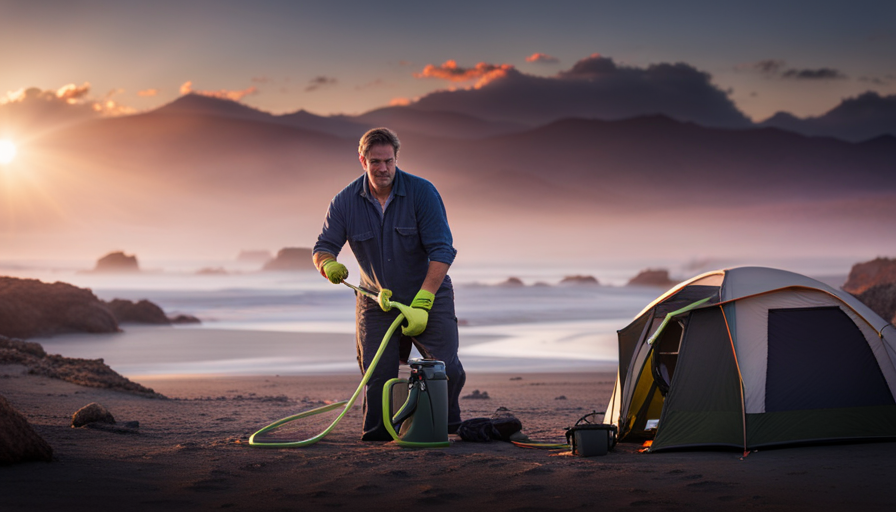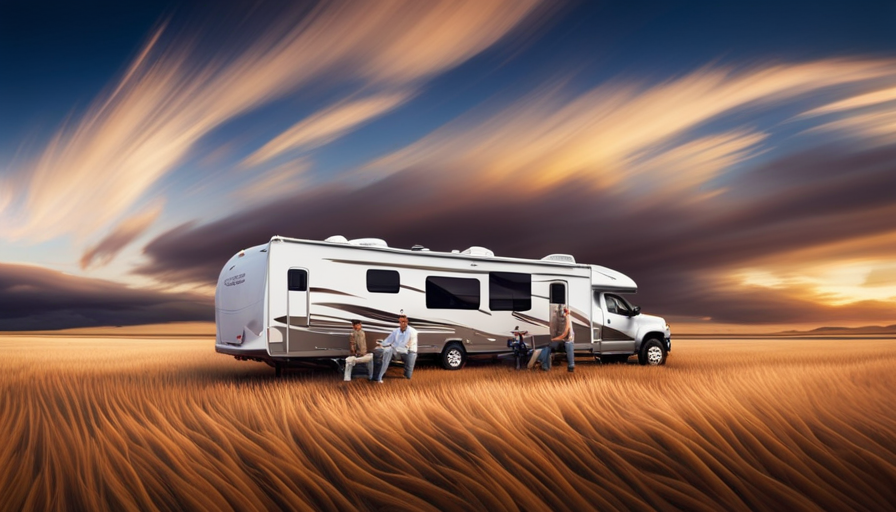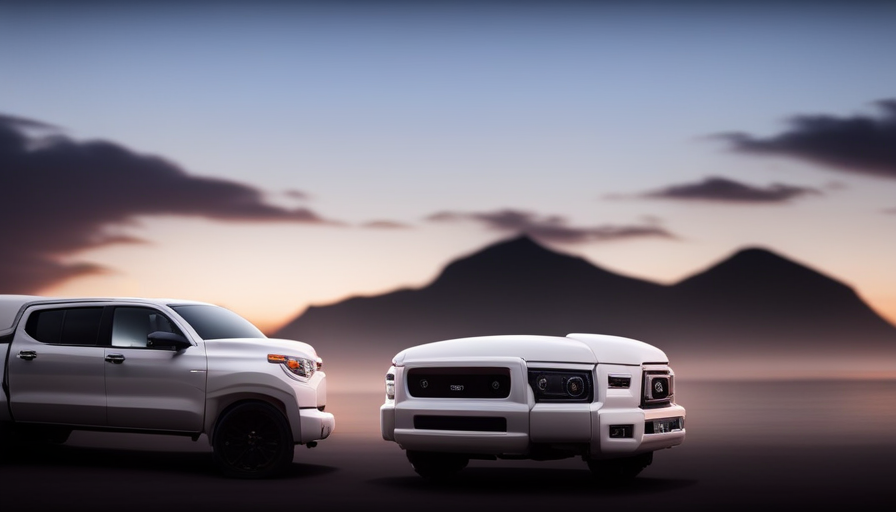Beginners Guides
How Heavy Is A Camper

Standing there, looking at the enormous camper before me, I was struck by its immense size. It was a giant, a rolling fortress poised to take on the vast wilderness. What I didn’t realize at the time, though, was that beneath its daunting exterior was a realm of intricacy.
How heavy is a camper, you ask? Well, my friend, prepare to be amazed.
In the world of campers, weight is not just a number. It’s a critical factor that affects everything from fuel efficiency to towing capabilities. Every square inch of this mobile abode is meticulously designed to strike the perfect balance between functionality and weight. And let me tell you, it’s no easy feat. Finding that sweet spot of optimal camper trailer weight is a delicate dance of materials, equipment, and design. Too heavy, and the camper becomes a burden on the road. Too light, and it may lack the durability and stability needed for a comfortable journey. Manufacturers are constantly seeking innovative solutions to reduce camper trailer weight without sacrificing quality or safety.
In this article, we will delve into the intricacies of camper weight. We’ll explore the factors that affect it, the various types of campers and their weight ranges, and the importance of proper weight distribution.
So buckle up and join me on this journey, as we unravel the mysteries of the camper’s weight and find the perfect balance for your next adventure.
Key Takeaways
- Factors affecting the weight of a camper include size, construction materials, and additional features.
- Proper weight distribution and choosing the right hitch are essential for towing performance and safety.
- Weighing the camper is important to ensure road safety and avoid overloading.
- Managing weight in a camper is crucial for stability, fuel efficiency, and compliance with legal requirements.
Factors Affecting the Weight of a Camper
You’ll be amazed at how much the weight of a camper can vary depending on factors like size, construction materials, and additional features. Understanding weight distribution and managing camper weight are crucial for a safe and enjoyable camping experience.
Size plays a significant role in determining the weight of a camper. Larger campers tend to be heavier due to the additional space and amenities they offer.
Construction materials also impact the weight. Campers made with lightweight materials such as aluminum or fiberglass are generally lighter compared to those constructed with heavier materials like steel.
Additional features can significantly increase the weight of a camper. Features like slide-outs, extra storage compartments, and appliances can add considerable weight. It’s important to consider these features carefully and determine which ones are necessary for your camping needs.
Understanding weight distribution is essential to ensure stability and safety while towing or driving a camper. Improper weight distribution can lead to swaying, decreased maneuverability, and even accidents. Properly distributing the weight by placing heavier items low and towards the center of the camper can help maintain balance.
Managing camper weight is crucial to avoid exceeding weight limits and capacities. Overloading a camper can lead to structural damage, tire blowouts, and poor fuel efficiency. Regularly checking the weight of your camper, including the weight of your belongings, is essential to ensure you stay within the limits.
In the subsequent section about understanding weight limits and capacities, we will delve deeper into how to calculate and stay within these limits to ensure a safe and enjoyable camping experience.
Understanding Weight Limits and Capacities
When it comes to understanding weight limits and capacities for campers, there are a few key points to consider.
First, the Gross Vehicle Weight Rating (GVWR) is the maximum weight that a camper can safely carry, including both the vehicle itself and its contents.
Second, the Payload Capacity refers to the maximum weight of all passengers, cargo, and additional accessories that the camper can handle.
Finally, the Tongue Weight and Hitch Capacity are important factors to consider when towing a camper, as they determine the maximum weight that can be safely attached to the vehicle’s hitch.
Gross Vehicle Weight Rating (GVWR)
The weight of a camper is determined by its Gross Vehicle Weight Rating (GVWR), which specifies the maximum weight it can safely carry. Understanding weight distribution is crucial for managing weight effectively and ensuring the safety and stability of the camper during travel. Here are three key points to consider:
-
GVWR: The GVWR includes the weight of the camper itself, along with any passengers, cargo, and fluids. Exceeding the GVWR can lead to mechanical issues and compromised handling.
-
Weight Distribution: Properly distributing weight within the camper is essential for maintaining balance and preventing sway. Heavier items should be placed low and towards the center, while lighter items should be secured higher up.
-
Managing Payload: The payload capacity is the maximum weight that can be added to the camper after accounting for its own weight. It’s important to calculate and manage the payload effectively to avoid overloading the camper and compromising its performance.
Understanding the GVWR and managing weight effectively are key factors in ensuring a safe and enjoyable camping experience. Transitioning into the subsequent section about ‘payload capacity,’ it is important to consider additional factors when determining how heavy a camper can be.
Payload Capacity
To fully understand the capacity of your camper, it’s essential to consider the payload and how it factors into weight management.
Payload capacity refers to the maximum weight that your camper can carry, including passengers, cargo, and any additional equipment. It is crucial to stay within this limit to ensure safe and efficient travel.
Proper weight distribution is also crucial for maintaining stability on the road. Distributing the weight evenly across the camper and not exceeding the payload capacity will minimize the risk of swaying or tipping.
Additionally, it is important to consider the tongue weight and hitch capacity when loading your camper. These factors affect how the camper connects to your vehicle and can impact overall towing performance.
Understanding payload capacity and weight distribution is key to ensuring a smooth and safe camping experience.
Now, let’s delve into the next section about tongue weight and hitch capacity.
Tongue Weight and Hitch Capacity
Understanding the importance of proper weight distribution, it’s crucial to consider the tongue weight and hitch capacity, as they directly impact towing performance. Tongue weight distribution refers to the amount of weight exerted on the hitch ball by the camper’s tongue. It is recommended to have a tongue weight that falls between 10% and 15% of the total camper weight. This ensures stability and control while towing. Choosing the right hitch is also essential. The hitch capacity should match or exceed the tongue weight of the camper. Failure to do so can result in poor handling, swaying, and even accidents. To help visualize this, refer to the table below:
| Tongue Weight Range (lbs) | Hitch Capacity (lbs) |
|---|---|
| 500 – 1,000 | 1,500 |
| 1,000 – 1,500 | 3,500 |
| 1,500 – 2,000 | 5,000 |
| 2,000 – 2,500 | 7,000 |
| 2,500 – 3,000 | 10,000 |
Considering tongue weight distribution and choosing the right hitch are vital steps in ensuring a safe and smooth towing experience. Now, let’s explore the different types of campers and their weight ranges.
Types of Campers and Their Weight Ranges
Let’s explore the weight ranges of different types of campers! When it comes to campers, there are various types available, each with its own weight range. Understanding these weight ranges is crucial for proper weight distribution and ensuring your vehicle’s towing capacity is not exceeded.
Here are five types of campers and their weight ranges:
-
Pop-up Campers: These lightweight campers typically weigh between 1,000 and 2,500 pounds. They’re easy to tow and provide a comfortable sleeping space.
-
Travel Trailers: Ranging from 2,500 to 12,000 pounds, travel trailers come in various sizes and offer amenities like kitchens and bathrooms. They require a vehicle with a higher towing capacity.
-
Fifth-Wheel Trailers: These campers range from 15,000 to 25,000 pounds and are designed to be towed by trucks with a specialized hitch. They offer spacious living areas and are suitable for long-term camping.
-
Toy Haulers: Ideal for outdoor enthusiasts, toy haulers can weigh between 5,000 and 20,000 pounds. They feature a rear cargo area for storing recreational vehicles.
-
Motorhomes: Ranging from 10,000 to 30,000 pounds, motorhomes are self-contained units with engines. They offer the convenience of driving and living in the same vehicle.
Understanding the weight range of different campers is essential for maintaining proper weight distribution and staying within your vehicle’s towing capacity. Now, let’s transition into the subsequent section about how to weigh your camper and ensure it’s safe for the road.
How to Weigh Your Camper
Now, let me show you how you can weigh your camper and ensure it’s road-safe. Understanding camper weight distribution is crucial for a safe and smooth journey. To calculate camper weight accurately, follow these steps:
| Location | Weight |
|---|---|
| Front Axle | [weight] |
| Rear Axle | [weight] |
| Total Weight | [weight] |
First, locate a certified weigh station near you. These facilities are equipped to measure the weight distribution of your camper. Begin by positioning your camper on the scale, making sure that the front axle is on one platform and the rear axle is on another. The scale will display the individual weights of each axle as well as the total weight of your camper.
Once you have the measurements, it’s important to analyze the weight distribution. Ideally, the front and rear axle weights should be within the manufacturer’s recommended limits. Proper weight distribution ensures stable handling and prevents excessive strain on your vehicle’s suspension system.
By accurately weighing your camper and understanding its weight distribution, you can ensure a safer and more comfortable journey. Now, let’s delve into the importance of proper weight distribution and how it impacts your camper’s performance on the road.
Importance of Proper Weight Distribution
To ensure a smooth and safe journey, it’s crucial for you to properly distribute the weight of your camper, allowing for optimal performance on the road. Proper weight distribution is of utmost importance for several reasons:
-
Stability: When the weight is evenly distributed, it helps maintain stability while driving. This reduces the risk of swaying or fishtailing, especially during turns or when encountering strong winds.
-
Braking Efficiency: Correct weight distribution ensures that the weight is evenly distributed between the front and rear axles. This improves braking efficiency, allowing you to stop your camper safely and quickly when needed.
-
Tire Wear: Improper weight distribution can lead to uneven tire wear. Uneven weight distribution can cause excessive wear on certain tires, leading to costly replacements and compromising your safety on the road.
-
Handling: When the weight is properly distributed, your camper will be easier to handle, making it more maneuverable and responsive to your steering inputs.
Improper weight distribution, on the other hand, can have a significant impact on your camper’s performance. It can lead to reduced stability, increased stopping distances, and excessive strain on certain components. Therefore, it’s essential to understand and manage weight distribution correctly.
In the next section, we’ll discuss some valuable tips for managing weight in your camper, ensuring optimal performance and safety throughout your journey.
Tips for Managing Weight in Your Camper
Ensuring proper weight distribution in your camper is essential for a smooth and safe journey, and here are some valuable tips to help you manage the weight effectively.
One of the most important aspects of managing storage in your camper is to distribute the weight evenly. This means placing heavy items towards the center and lower parts of the camper, while lighter items can be placed towards the outer edges. This will help maintain stability and prevent the camper from swaying or tipping over while on the road.
Another tip for managing weight in your camper is to pack strategically. By organizing your belongings and grouping them based on weight and size, you can optimize the use of space and ensure that the camper remains balanced.
Additionally, it’s important to regularly check the weight of your camper to ensure that it doesn’t exceed the manufacturer’s recommendations. Overloading your camper can lead to decreased maneuverability and increased risk of accidents.
Lastly, consider investing in weight distribution and sway control systems. These devices can help distribute the weight evenly across the entire camper, reducing strain on the hitch and improving towing stability.
By following these tips and managing weight distribution effectively, you can ensure a safer and more enjoyable camping experience.
When it comes to legal requirements and regulations, it’s important to be aware of the specific guidelines set by your local jurisdiction.
Legal Requirements and Regulations
When it comes to legal requirements and regulations for campers, there are two key points to consider: weight restrictions on roads and bridges, and licensing and registration.
As a camper owner, I need to be aware of weight restrictions imposed by local authorities to ensure that my camper doesn’t exceed the maximum allowable weight for certain roads and bridges.
Additionally, I must comply with licensing and registration requirements to legally operate my camper and avoid any potential fines or penalties.
Weight Restrictions on Roads and Bridges
Did you know that bridges in the United States have weight restrictions to prevent damage and ensure safety? These weight limitations are put in place to protect the structural integrity of the bridges and prevent accidents. It is crucial for camper owners to be aware of these restrictions before hitting the road. To help you understand the weight restrictions, here is a table that provides examples of common weight limits for different types of bridges:
| Bridge Type | Weight Limit (in tons) |
|---|---|
| Small Bridge | 5 |
| Medium Bridge | 15 |
| Large Bridge | 25 |
| Highway Bridge | 40 |
| Suspension Bridge | 60 |
Knowing the weight limits of the bridges you will encounter during your journey is essential for both your safety and the preservation of the infrastructure. Once you have a clear understanding of weight restrictions, you can move on to the next section about licensing and registration, ensuring that you are fully prepared for your camper adventure.
Licensing and Registration
Don’t overlook the importance of properly licensing and registering your vehicle before embarking on your adventure. Meeting the legal requirements for licensing and registration ensures that your camper is compliant with weight restrictions and other regulations.
Each state has its own specific guidelines for registering and licensing campers, so it’s crucial to familiarize yourself with the requirements of the state you reside in or plan to travel through. These requirements typically include providing proof of ownership, insurance, and paying the necessary fees. By adhering to these regulations, you can avoid potential fines or penalties.
Once your camper is properly licensed and registered, you can now move on to considering the impact of weight on fuel efficiency, which we will explore in the next section.
Impact of Weight on Fuel Efficiency
When it comes to the impact of weight on fuel efficiency, it’s important to understand how weight affects fuel consumption. The heavier the camper, the more fuel it requires to move.
To improve fuel efficiency, there are several tips that can be implemented. One tip is to reduce unnecessary weight by packing only essential items. Another tip is to maintain proper tire pressure. Additionally, driving at a consistent speed can also help improve fuel efficiency.
Understanding Fuel Consumption
Traveling in a camper is like embarking on a journey through a vast and unpredictable landscape, with every mile covered fueling not only the vehicle but also our thirst for adventure. Understanding fuel consumption is crucial in maximizing mileage and minimizing the impact on the environment.
Fuel consumption refers to the amount of fuel used by the vehicle over a specific distance. It is influenced by various factors, such as weight, engine efficiency, driving habits, and road conditions. When it comes to campers, weight plays a significant role in fuel consumption. The heavier the camper, the more fuel it requires to move.
Therefore, it is important to consider the weight of the camper and reduce unnecessary load to improve fuel efficiency. By optimizing weight and adopting fuel-saving driving techniques, we can embark on our adventurous journey while minimizing our impact on the environment.
Tips for Improving Fuel Efficiency
To enhance your fuel efficiency, it’s essential to implement strategies that can help you save money and reduce your environmental impact. Here are three key tips to improve your fuel efficiency when towing a camper:
-
Improving aerodynamics: Streamline your camper by removing any unnecessary accessories or equipment that may create drag. Consider installing aerodynamic add-ons, such as wind deflectors or streamlined covers for your camper.
-
Alternative fuel options: Explore alternative fuel options that can help you reduce fuel consumption and emissions. Electric or hybrid vehicles are excellent choices for towing a camper, as they offer improved fuel efficiency and lower environmental impact compared to traditional gasoline engines.
-
Regular maintenance: Keep your vehicle and camper in top condition by following regular maintenance schedules. Properly inflated tires, clean air filters, and timely oil changes can significantly improve fuel efficiency.
By implementing these strategies, you can enhance your fuel efficiency and save money on your camping adventures.
Now, let’s delve into considerations for towing a camper.
Considerations for Towing a Camper
When considering towing a camper, there are several key points to keep in mind.
First, it’s important to understand your vehicle’s tow capacity, which is the maximum weight it can safely tow. This information can typically be found in the owner’s manual or by contacting the manufacturer.
Additionally, trailer sway control is essential for maintaining stability while towing. This system helps to prevent the trailer from swaying from side to side, ensuring a safer and smoother towing experience.
Lastly, having a braking system that’s properly equipped for towing is crucial. This system helps the vehicle and trailer to stop efficiently and safely, especially when towing heavy loads.
Vehicle Tow Capacity
Did you know that many vehicle manufacturers provide a tow capacity rating for their vehicles? This rating indicates the maximum weight that your vehicle can safely tow. It is crucial to know your vehicle’s tow capacity to ensure vehicle safety and prevent damage.
Here are some important points to consider:
- Consult your vehicle’s owner’s manual or contact the manufacturer to determine the tow capacity.
- Consider the weight of the camper you plan to tow and ensure it falls within your vehicle’s tow capacity.
- Distribute the weight evenly in the camper and secure any loose items to prevent shifting during towing.
- Invest in a weight distribution hitch and trailer brakes for added control and safety.
Understanding your vehicle’s tow capacity is vital for safe and efficient towing. Now, let’s explore the next topic: trailer sway control.
Trailer Sway Control
Trailer sway control is a crucial feature to ensure a smooth and safe towing experience. It is designed to prevent the trailer from swaying or fishtailing while being towed behind a vehicle. This is especially important when the trailer is heavy or when it’s being towed at high speeds.
Trailer sway prevention systems work by detecting any side-to-side movement of the trailer and applying brakes or adjusting the trailer’s weight distribution to bring it back in line with the towing vehicle. Weight distribution systems play a key role in this process as they help distribute the weight of the trailer more evenly, reducing the likelihood of sway.
Now, let’s transition into the subsequent section about braking systems. It’s important to note that while trailer sway control is essential for maintaining stability during towing, braking systems also play a pivotal role in ensuring a safe towing experience.
Braking Systems
Braking systems are a crucial component in ensuring a smooth and secure towing experience. These systems are responsible for controlling the speed and stopping power of the camper, ensuring optimal braking efficiency. To maintain this efficiency, regular maintenance is required.
This includes checking and replacing brake pads, inspecting brake lines for any signs of wear or damage, and ensuring proper brake fluid levels. Additionally, it’s important to periodically test the braking system to ensure it’s functioning correctly. This can be done by performing a brake test in a controlled environment.
By maintaining and testing the braking system, you can ensure that it’ll perform reliably when needed, providing you with the confidence and safety required for towing a camper.
Transitioning to the subsequent section about finding the right balance, it’s important to consider other factors such as weight distribution and sway control.
Conclusion: Finding the Right Balance
To strike the perfect balance, it’s crucial to consider the weight of a camper. Finding the right balance and managing weight properly can greatly affect the overall performance and safety of the camper. Here are three key points to keep in mind when considering the weight of a camper:
-
Payload Capacity: It’s important to know the payload capacity of your camper, which refers to the maximum weight it can safely carry. Exceeding this limit can lead to poor braking performance, reduced control, and increased wear and tear on the vehicle.
-
Weight Distribution: Proper weight distribution is essential for maintaining stability while towing a camper. Placing too much weight on the rear of the camper can cause fishtailing, while having too much weight at the front can affect steering and braking. It’s recommended to distribute the weight evenly and ensure that it’s within the manufacturer’s guidelines.
-
Braking System: The braking system of a camper should be capable of handling the additional weight. Upgrading to a system that’s designed for heavier loads can improve braking performance and ensure safer travels.
Finding the right balance and managing weight properly is vital for the performance and safety of a camper. By considering payload capacity, weight distribution, and the braking system, you can ensure a smooth and enjoyable camping experience.
Frequently Asked Questions
What are the different types of campers available?
There are various types of camper vans available, each with its own unique features and advantages. From compact pop-up campers to spacious motorhomes, there’s a camper to suit every traveler’s needs.
Camper trailers, on the other hand, offer the benefits of being lightweight and easy to tow. They provide a comfortable living space, complete with sleeping quarters, kitchen facilities, and bathroom amenities.
Whether you prefer the convenience of a van or the versatility of a trailer, there’s a camper out there for you.
How can I weigh my camper accurately?
To accurately weigh a camper, it’s crucial to use proper weighing methods. This ensures the weight is measured precisely, which is of utmost importance.
One common method is using a weighbridge, which provides accurate readings by measuring the entire camper’s weight. Another option is using a portable axle scale, allowing you to measure the weight of individual wheels or axles.
Remember, accurate weight measurement is essential for safe towing and to determine if your vehicle can handle the camper’s weight.
What are the legal requirements and regulations regarding the weight of a camper?
Legal requirements and weight regulations for campers vary by jurisdiction. It’s crucial to understand these guidelines to ensure compliance and safe operation.
Authorities may specify maximum weight limits for campers, including both the vehicle and its contents. These regulations aim to prevent accidents, damage to roads, and ensure the safety of other drivers on the road.
It’s essential to consult local laws and regulations to ensure that your camper meets all the necessary requirements.
How does weight distribution affect the performance of a camper?
Weight distribution plays a crucial role in the performance of a camper. Proper weight distribution ensures stability, maneuverability, and overall safety while on the road. When the weight is distributed evenly, it reduces the risk of swaying or fishtailing.
Additionally, it helps maintain optimal tire pressure and prevents excessive wear and tear on the suspension system. By understanding the importance of weight distribution, campers can enhance their overall driving experience and minimize potential hazards.
What are some tips for managing the weight of a camper effectively?
Managing the weight of a camper is crucial for optimal performance. To effectively manage camper weight, reducing unnecessary items is key. Start by evaluating each item’s necessity and weight. Consider using lightweight materials for equipment and furnishings.
Distribute the weight evenly throughout the camper to maintain stability and balance. Additionally, regularly check the weight distribution and make adjustments as needed. By following these tips, you can ensure a well-managed and efficient camper weight.
Are Camper Trailers and Campers the Same Weight?
When it comes to comparing camper trailers and campers, understanding their weight differences is essential. Camper trailer weight explained: Campers tend to be significantly lighter than camper trailers due to their compact size and basic amenities. It is crucial to consider this factor while planning your camping adventures and ensuring your vehicle can handle the weight.
Conclusion
In conclusion, finding the right balance when it comes to the weight of a camper is crucial for a smooth and safe journey. Just like a skilled tightrope walker, we must carefully consider factors such as weight limits, distribution, and legal requirements.
By understanding the impact of weight on fuel efficiency and considering towing capabilities, we can ensure a comfortable and enjoyable camping experience.
So, whether you’re a seasoned camper or a novice adventurer, remember that finding the perfect weight balance for your camper is the key to a successful trip. Happy camping!
Jason is the author of Laienhaft, a blog for all things outdoor and camping. If you’re looking for the best tent to take on your next camping trip, or need some advice on how to get started with recreational camping, Jason has you covered. He’s also an expert on survival skills – if you’re ever lost in the wilderness, he’s the guy you want to find!
Beginners Guides
How To Design A Camper Van

Imagine a blank canvas, waiting to be transformed into a masterpiece that perfectly reflects your travel dreams and lifestyle.
Designing a camper van is like creating a work of art, where every brushstroke is intentional and every detail holds significance. It is a process that requires careful planning, creativity, and a deep understanding of your own needs and desires.
In this article, I will guide you through the steps of designing your very own camper van, a mobile sanctuary that will take you on unforgettable adventures. From choosing the right van to personalizing the interior, I will provide you with the knowledge and inspiration you need to create a space that is functional, comfortable, and uniquely yours.
So, grab your imagination and let’s embark on this design journey together. Whether you’re a weekend warrior or a full-time nomad, this article will help you bring your camper van vision to life.
Get ready to turn that blank canvas into a remarkable masterpiece on wheels.
Key Takeaways
- Careful planning, creativity, and understanding of personal needs and desires are essential in designing a camper van.
- Consider travel budget, outdoor activities, and storage space when prioritizing features and amenities.
- Choose the right van based on size, budget, mechanical condition, and fuel efficiency.
- Optimize space utilization, choose multi-functional furniture, and strategically position essential amenities for a well-designed camper van.
Determine Your Travel Needs and Lifestyle
Imagine yourself traveling down a scenic highway, fully equipped with a camper van that perfectly suits your travel needs and lifestyle. Designing a camper van starts with determining your travel needs and lifestyle.
First, consider your travel budget. It’s important to establish how much you’re willing to spend on your camper van conversion. This will help you prioritize the features and amenities you want to include.
Next, think about your outdoor activities. Are you planning on doing a lot of hiking, biking, or water sports? If so, you might want to consider adding storage space for equipment like bikes, surfboards, or kayaks. Additionally, if you enjoy cooking outdoors, you might want to include an outdoor kitchen setup with a stove, sink, and storage for cooking utensils.
When considering your lifestyle, think about your sleeping arrangements. Will you be traveling alone or with a partner? Do you prefer a fixed bed or a convertible one? This will help you determine the layout and size of your camper van.
Incorporating these factors into your design will ensure that your camper van is tailored to your specific travel needs and lifestyle.
Now, let’s move on to choosing the right van for your conversion.
Choose the Right Van for Your Conversion
When selecting the ideal vehicle for your conversion project, it’s important to consider the size and layout that best suits your needs and preferences. Choosing the right van for your conversion is a crucial step in creating your dream camper van.
Here are some key factors to consider:
-
Size: Determine how much space you need for living, sleeping, and storage. Consider the length, height, and width of the van to ensure it can accommodate your requirements.
-
Budget considerations: Set a budget for your conversion project and research the cost of different van models. Remember to include the cost of any necessary repairs or modifications.
-
Mechanical condition: Check the mechanical condition of the van before purchasing. Look for signs of wear and tear, rust, and any potential issues that may require costly repairs.
-
Fuel efficiency: Consider the fuel efficiency of the van, especially if you plan on traveling long distances. A more fuel-efficient van can save you money in the long run.
Choosing the right van is just the first step in designing your camper van. Once you have your vehicle, you can move on to planning your layout and floor plan.
Plan Your Layout and Floor Plan
To create your perfect living space, start by carefully planning the layout and floor plan of your conversion project. One of the key aspects to consider when designing a camper van is furniture placement. Maximizing space utilization is crucial in such a compact living area.
Begin by taking accurate measurements of your van’s interior dimensions. This will help you determine the available space and plan accordingly. Consider the functionality and flow of your layout. Choose furniture pieces that can serve multiple purposes to make the most of the limited space. Opt for foldable or collapsible furniture that can be easily stored away when not in use.
Additionally, think about the placement of essential amenities such as the kitchenette, bathroom, and sleeping area. Strategically position these elements to optimize comfort and convenience.
By carefully planning your layout and furniture placement, you can create a camper van that maximizes space utilization while still providing all the amenities you need.
In the next section, we will discuss how to install essential amenities and features seamlessly into your design.
Install Essential Amenities and Features
When designing a camper van, it’s crucial to consider the installation of essential amenities and features.
The kitchen and cooking area should be well-equipped with a stove, sink, and refrigerator, allowing for easy meal preparation and storage.
The sleeping and seating area should be comfortable and versatile, with the option to convert into a bed or provide additional seating during the day.
Lastly, the bathroom and shower facilities should be compact yet functional, ensuring that basic hygiene needs are met while on the road.
Kitchen and Cooking Area
One interesting statistic about designing a camper van’s kitchen and cooking area is that incorporating a compact refrigerator can save up to 15% more space compared to a standard fridge. This is important when considering the limited space available in a camper van.
To maximize efficiency and functionality, it’s essential to carefully choose the kitchen appliances that’ll be installed. Compact yet versatile appliances, such as a two-burner stove, a microwave oven, and a small sink, can greatly enhance the meal preparation experience on the road.
Additionally, having ample storage space for utensils, pots, and pans is crucial. Consider installing overhead cabinets and drawers to keep everything organized and easily accessible.
In order to create a cozy and functional sleeping and seating area, it’s important to consider the size and placement of the kitchen appliances.
Sleeping and Seating Area
Create a cozy and comfortable sleeping and seating area by carefully considering the size and placement of your sleeping arrangements and seating options.
When it comes to bedding, opt for comfortable mattresses and soft linens to ensure a good night’s sleep. Consider the size of your camper van and choose furniture that’s multi-functional, such as a sofa that can also be converted into a bed. This’ll maximize the space available and provide flexibility in how you use the area.
Additionally, think about the placement of windows and curtains to allow for natural light and privacy.
Now that you have a comfortable sleeping and seating area, let’s move on to discussing bathroom and shower facilities.
Bathroom and Shower Facilities
To ensure a luxurious and convenient camping experience, it’s important to carefully consider the bathroom and shower facilities within your mobile home. When designing the bathroom, it’s crucial to maximize the use of space while providing all necessary amenities.
Here are some key considerations for bathroom design:
-
Optimize layout: Arrange the toilet, sink, and shower in a way that maximizes functionality and allows for easy movement.
-
Use compact fixtures: Choose space-saving fixtures such as a corner sink or a wall-mounted toilet to optimize space.
-
Consider storage: Incorporate built-in shelves or cabinets to store toiletries and towels efficiently.
For shower installation, there are a few options to consider:
-
Wet room: A wet room design eliminates the need for a separate shower enclosure and allows for easy cleaning.
-
Compact shower stall: Install a compact shower stall with sliding doors to save space.
By carefully planning the bathroom and shower facilities, you can create a comfortable and functional space in your camper van.
Next, let’s explore how to optimize storage space within your mobile home.
Optimize Storage Space
Maximize your storage space in the camper van by thinking outside the box and utilizing every nook and cranny. When designing a camper van, it’s crucial to maximize organization and utilize vertical space efficiently. This ensures that you have enough room to store all your essentials without cluttering the living area. To achieve this, consider incorporating clever storage solutions such as overhead compartments, under-bed drawers, and hanging organizers. By utilizing vertical space, you can make the most of every inch available.
To help you visualize how to optimize storage space in your camper van, here’s a handy table showcasing different storage ideas:
| Storage Solution | Description | Benefits |
|---|---|---|
| Overhead compartments | Install cabinets or shelves above the living area | Utilizes unused space and keeps items organized |
| Under-bed drawers | Utilize the space beneath the bed for storage | Provides easy access to frequently used items |
| Hanging organizers | Hang storage pockets or baskets on walls or doors | Maximizes vertical space and keeps small items within reach |
By maximizing storage space, you can ensure a clutter-free and organized camper van experience. Now, let’s transition to the next section where we will discuss energy and power options for your camper van.
Consider Energy and Power Options
After optimizing the storage space in your camper van, it’s time to consider energy and power options. This is a crucial aspect of designing a camper van, as it determines how you will generate and store electricity while on the road.
One popular and eco-friendly choice is to install solar panels on the roof of your van. These panels harness the power of the sun and convert it into usable energy, allowing you to charge your devices and run appliances without relying solely on traditional power sources.
When selecting battery options, it’s important to choose ones that are specifically designed for off-grid living. Deep cycle batteries are a popular choice as they can handle the demands of running appliances and can be recharged efficiently. Additionally, considering a battery isolator or a battery management system can help regulate and optimize the use of power in your camper van.
With solar panels and the right battery options, you can enjoy the freedom of generating your own power while on the road.
As we move on to the next section about insulating and ventilating your van, it’s important to ensure that your energy and power systems are properly integrated into the overall design.
Insulate and Ventilate Your Van
Ensuring proper insulation and ventilation in your mobile home-on-wheels is like creating a cozy haven where cool air flows seamlessly, keeping you comfortable during the scorching summer days and warm and snug during chilly winter nights.
When it comes to insulation, there are a few key tips to keep in mind. First, consider using spray foam insulation for the walls and ceiling to create an airtight seal. This will help prevent drafts and keep the temperature inside consistent. Additionally, adding insulation to the floor can help further regulate the temperature and reduce noise from outside.
As for ventilation, it’s important to have a good airflow system in place. Installing roof vents and windows that can be opened will allow fresh air to circulate throughout the van. You can also consider adding a fan or air conditioner for extra comfort.
Proper insulation and ventilation are essential for creating a comfortable living space in your camper van.
Now, let’s move on to the next section where we’ll explore how to personalize your camper with decor and accessories.
Personalize Your Camper with Decor and Accessories
Make your mobile home-on-wheels truly your own by adding your personal touch with unique decor and accessories that reflect your style and make it feel like home.
Camper van decor trends are constantly evolving, and there are plenty of options to choose from to create a cozy and personalized space. One popular trend is to incorporate natural elements such as wood accents and plants to bring a touch of nature indoors. You can also opt for a minimalist design with clean lines and neutral colors for a sleek and modern look.
Additionally, DIY camper van accessories are a great way to add functionality and personality to your space. From handmade curtains and cushions to customized storage solutions, the possibilities are endless. Get creative and think outside the box to design accessories that suit your specific needs and style.
As you add your personal touches, don’t forget to consider how each element will impact the overall functionality and comfort of your camper van.
In the next section, we’ll discuss how to test and adjust your design to ensure it meets your needs perfectly.
Test and Adjust Your Design
To ensure your personalized touches enhance both functionality and comfort, it’s essential to thoroughly test and make necessary adjustments to your camper’s layout and decor. This step is crucial in achieving a design that perfectly suits your needs and preferences.
Here are three important aspects to consider during the testing and adjustment phase:
-
Functionality: Test the functionality of your camper’s layout by spending time inside and simulating real-life scenarios. Check if the storage spaces are easily accessible and if the furniture is comfortable and practical. Make adjustments as needed to optimize the functionality of your design.
-
Comfort: Pay attention to the overall comfort of your camper. Test the bed, seating areas, and other amenities to ensure they provide the desired level of comfort. Consider adding cushions, blankets, or other accessories to enhance coziness.
-
Design improvement: Continuously evaluate the aesthetics of your camper van. Assess the harmony of colors, patterns, and decorative elements. Experiment with different decor options and make adjustments to create a visually pleasing environment that reflects your personal style.
By thoroughly testing and adjusting your camper van design, you can achieve a space that not only looks great but also functions well. Once you’re satisfied with the results, you can hit the road and enjoy your customized camper van, ready to embark on new adventures.
Hit the Road and Enjoy Your Customized Camper Van
Once you hit the road in your personalized home on wheels, every mile becomes a new chapter in your adventure story, with breathtaking landscapes serving as the vibrant backdrop to your nomadic lifestyle. Before embarking on your journey, it’s important to consider the customization options and budgeting considerations for your camper van.
Customization options are endless when it comes to designing your camper van. From layout to interior design, you have the freedom to create a space that suits your needs and preferences. Consider factors such as the number of beds, kitchen facilities, storage space, and bathroom amenities. Look for versatile furniture and appliances that can maximize your space and make your life on the road more comfortable.
Budgeting considerations are crucial when designing your camper van. Establish a realistic budget and prioritize your expenses accordingly. Research different suppliers for materials and appliances to find the best deals. Look for second-hand items that are still in good condition to save money. It’s also important to plan for unexpected expenses that may arise during your journey, such as repairs or maintenance.
Remember, designing a camper van is a personal and exciting process. Take your time to research and explore different customization options while keeping your budget in mind.
Once you hit the road, your customized camper van will be the perfect companion for your nomadic lifestyle, allowing you to explore the world with comfort and style.
Frequently Asked Questions
How much does it cost to convert a van into a camper?
Converting a van into a camper can vary in cost depending on whether you opt for a DIY or professional conversion. DIY conversions can be more affordable, with costs ranging from $1,000 to $15,000, depending on the materials and features you choose.
On the other hand, professional conversions can cost anywhere from $20,000 to $100,000, depending on the level of customization and luxury.
It’s important to consider your budget and desired features when deciding which option is best for you.
What are the legal requirements for converting a van into a camper?
When converting a van into a camper, it’s important to consider the legal requirements and safety regulations.
Legal documentation such as registration and insurance should be updated to reflect the new use of the vehicle.
Safety requirements may include installing proper seat belts, ventilation, and fire extinguishers.
It’s also essential to comply with any local laws regarding the conversion process.
How do I choose the right insulation for my camper van?
Choosing the right insulation for your camper van is crucial for comfort and energy efficiency. There are various insulation types available, each with its own pros and cons. To make the best choice, consider factors like R-value, moisture resistance, and ease of installation.
One simile that helps illustrate the importance of insulation is comparing it to a cozy blanket on a cold night. Just like a blanket keeps you warm, insulation keeps your van comfortable in all weather conditions.
What are the best options for heating and cooling in a camper van?
When it comes to heating options for a camper van, there are a few popular choices. One option is a propane heater, which is efficient and provides consistent heat.
Another option is a diesel heater, which is reliable and can also be used to heat water.
As for cooling options, a rooftop air conditioner is commonly used, providing cool air during hot summer days. Additionally, portable fans and vent fans can help circulate air and keep the van cool.
How do I maintain the electrical system in my camper van?
To maintain my camper van’s electrical system, I regularly inspect all connections and wiring for any signs of damage or loose connections.
I also keep a close eye on the battery, checking its voltage and ensuring it’s properly charged.
Troubleshooting common electrical issues involves checking fuses, circuit breakers, and switches.
It’s important to have a basic understanding of electrical systems and carry a voltage tester and spare fuses for quick repairs on the road.
Conclusion
In conclusion, designing a camper van is a rewarding and exciting process that allows you to create a personalized travel experience. By considering your travel needs, choosing the right van, and planning your layout carefully, you can optimize space and create a functional living area.
One interesting statistic to note is that the number of people living in vans in the United States has increased by 83% in the past decade, showcasing the growing popularity of van life. So, why not join the trend and hit the road in your very own customized camper van?
Jason is the author of Laienhaft, a blog for all things outdoor and camping. If you’re looking for the best tent to take on your next camping trip, or need some advice on how to get started with recreational camping, Jason has you covered. He’s also an expert on survival skills – if you’re ever lost in the wilderness, he’s the guy you want to find!
Beginners Guides
How To Turn Your Car Into A Camper

Did you know that over 70% of people in the United States enjoy camping? If you’re one of these outdoor enthusiasts, you might be interested in transforming your vehicle into a camper for your next adventure.
Converting your car into a cozy living space on wheels can provide you with the freedom and flexibility to explore the great outdoors while still enjoying some of the comforts of home.
In this article, we will guide you through the process of transforming your car into a camper, from assessing your car’s suitability for conversion to adding personal touches and decor. We will provide you with step-by-step instructions, helpful tips, and a list of necessary tools and materials.
So, whether you’re planning a weekend getaway or a cross-country road trip, get ready to hit the road in your very own custom-made camper!
Key Takeaways
- Assess the size and type of car to determine its suitability for conversion into a camper.
- Optimize space utilization by utilizing vertical space with shelves or cabinets and considering furniture placement.
- Install insulation for temperature control and blackout curtains or window covers for a comfortable sleeping environment.
- Create effective storage solutions for organizing belongings and install a basic kitchen setup with portable stove, compact refrigerator, and cooking utensils.
Assess Your Car’s Suitability for Conversion
Before you start dreaming about converting your car into a camper, it’s crucial to assess if your vehicle is up for the adventure! Car modification is a complex process that requires careful planning and consideration.
First and foremost, you need to evaluate the size and type of your car. Larger vehicles like vans or SUVs provide more space and are often better suited for camper conversions. However, with some creativity and smart storage solutions, smaller cars can also be transformed into cozy camping havens.
Once you’ve determined that your car is suitable for conversion, it’s time to think about the camping essentials you’ll need. Consider the number of people who’ll be using the camper and their sleeping arrangements. Will you need a foldable bed or sleeping bags? Don’t forget about storage space for clothes, cooking utensils, and other camping gear. It’s also essential to assess your car’s electrical system. Do you have enough power to run appliances like a refrigerator or lights? If not, you may need to invest in a secondary power source.
Now that you’ve assessed your car’s suitability and gathered the necessary camping essentials, it’s time to plan your layout and design.
Plan Your Layout and Design
First, envision the perfect layout and design for transforming your vehicle into a cozy camper. When planning your layout and design, consider the furniture placement to optimize space utilization. Think about what essentials you need, such as a bed, storage, and a small kitchen area. You can maximize the available space by utilizing vertical space effectively.
Consider installing shelves or cabinets above the bed or along the sides of the vehicle to store your belongings. This will help keep the floor area clear and create a more open and spacious feel inside.
When designing your layout, take into account the size and shape of your vehicle. Measure the dimensions accurately and consider any obstacles like wheel wells or windows that may affect furniture placement. Think about how the furniture will be secured in the vehicle and ensure that it is safe and stable during travel.
As you plan your layout and design, keep in mind your personal preferences and needs. Consider the activities you plan on doing during your camping trips and design your camper accordingly. By carefully planning the layout and design, you can create a comfortable and functional space that meets your specific requirements.
In the next section, we will discuss how to gather the necessary tools and materials for converting your car into a camper.
Gather the Necessary Tools and Materials
To create a cozy camper, gather the tools and materials needed for the conversion process, ensuring you have everything necessary for the project.
The tools needed for this transformation include a drill, screwdriver, jigsaw, measuring tape, and a utility knife. These tools will help you with various tasks such as cutting and securing materials.
As for the materials required, you’ll need plywood for constructing the bed frame and storage units, as well as foam insulation for added comfort. Additionally, you’ll require screws, nails, and brackets to assemble the different components securely. Don’t forget to get adhesive glue for attaching the insulation material.
Other essential materials include fabric for curtains and cushions, electrical wiring for lighting and charging devices, and a ventilation system for fresh air circulation.
Once you have gathered all the necessary tools and materials, you’ll be ready to move on to the next step: installing insulation for temperature control. This will ensure that your camper remains comfortable in any weather conditions.
Install Insulation for Temperature Control
Now that we’ve gathered all the necessary tools and materials, it’s time to get started on installing insulation for optimal temperature control in our cozy camper.
Insulation is crucial to create a comfortable living space, protecting us from extreme weather conditions and reducing noise levels. There are various insulation techniques and materials to choose from, depending on your budget and preferences.
One popular insulation technique is using foam board insulation. This material is lightweight, easy to install, and provides excellent insulation properties. Simply measure and cut the foam board to fit the walls, ceiling, and floor of your car. Secure it in place using adhesive or screws, ensuring a snug fit to prevent any air leaks.
Another option is reflective insulation, which uses a layer of reflective material to bounce heat away from the camper. This type of insulation is particularly effective in hot climates. Install it by attaching the reflective material to the interior walls and ceiling using adhesive or staples.
Remember to also insulate windows and doors to prevent heat loss. Use window insulation film or thermal curtains to create a barrier against cold drafts. Finally, seal any gaps or cracks with weatherstripping or silicone caulk.
With the insulation in place, we can now move on to the next step: building a sleeping and seating area.
Build a Sleeping and Seating Area
Once the insulation’s in place, it’s time to create a cozy and comfortable sleeping and seating area for ultimate relaxation in your camper.
The seating arrangements in your converted car can vary depending on the available space and your personal preferences. One option is to install a foldable bench seat that can double as a seating area during the day and a bed at night. This allows for maximum use of space and provides a comfortable spot to relax or dine.
Another option is to install swivel seats in the front of the car, which can be turned around to face the living area, creating a cozy seating area for socializing or enjoying the view.
For sleep comfort, consider investing in a good quality mattress or mattress topper that fits the dimensions of your sleeping area. Memory foam mattresses are a popular choice for camper conversions as they provide excellent support and can be easily cut to fit irregular shapes. Additionally, adding blackout curtains or window covers can help create a dark and peaceful sleeping environment.
To create storage solutions for your belongings, we’ll explore clever ways to maximize storage space in your camper.
Create Storage Solutions for Your Belongings
Transforming your vehicle into a cozy sanctuary involves creating clever storage solutions to keep your belongings organized and easily accessible. When you’re on the road, maximizing space becomes crucial.
One great way to do this is by utilizing storage bins or crates that can fit neatly under your bed or seating area. These bins can hold clothing, cooking utensils, and other essentials, keeping them out of the way but still within reach.
Another smart storage solution is utilizing the walls of your vehicle. Install hooks or magnetic strips to hang items like hats, keys, or cooking tools. You can also attach small baskets or pockets to store smaller items like toiletries or snacks. By utilizing the vertical space, you can keep your belongings organized and create a clutter-free environment.
Additionally, consider investing in collapsible storage solutions. There are various collapsible storage bins, baskets, and bags available on the market that can be easily folded and stored when not in use. This’ll save you valuable space and allow you to organize your belongings efficiently.
Creating effective storage solutions is essential when turning your car into a camper. By maximizing space and organizing your belongings, you can create a comfortable and clutter-free environment.
In the next section, we’ll discuss how to install a basic kitchen setup to enhance your camping experience.
Install a Basic Kitchen Setup
Enhance your camping experience by installing a basic kitchen setup that’ll leave your taste buds craving for more. Having a functional kitchen in your camper lets you enjoy delicious meals on the road, without relying solely on pre-packaged food.
Here are four essential items you’ll need to create a basic kitchen setup:
-
Basic Kitchen Appliances: Invest in a portable stove or cooktop that runs on a small propane canister. This’ll allow you to cook meals wherever you park your camper. Additionally, a compact refrigerator or cooler will keep your perishable items fresh and drinks cold.
-
Cooking Essentials: Stock up on cooking utensils like pots, pans, and a set of knives. Don’t forget basic kitchen tools such as a cutting board, can opener, and measuring cups. These essentials’ll make meal preparation a breeze.
-
Food Storage: Maximize space by using stackable food containers and storage bins. This’ll help keep your ingredients organized and prevent spills while driving. Consider using collapsible silicone containers to save even more space.
-
Dishwashing Supplies: Keep your kitchen clean with eco-friendly dish soap and a small dish rack. Opt for biodegradable products to minimize your impact on the environment.
Once your basic kitchen setup is complete, the next step is to set up a power source for electricity. This’ll allow you to fully utilize your kitchen appliances and other electrical devices.
Set Up a Power Source for Electricity
To create a fully functional kitchen setup in your camper, start by setting up a power source for electricity. One of the best ways to harness renewable energy is by installing solar panels on the roof of your camper. These panels will capture sunlight and convert it into usable electricity, providing you with a sustainable and eco-friendly power source.
Additionally, you’ll need a power inverter to convert the direct current (DC) power generated by the solar panels into alternating current (AC) power that can be used to power your appliances. This will allow you to charge your devices, run small kitchen appliances, and keep your lights on while you’re on the road.
When choosing solar panels and a power inverter, make sure to consider the power requirements of your kitchen appliances. Calculate the total wattage needed and choose panels and an inverter that can handle that load. Additionally, consider the size and weight of the panels, as well as their durability and efficiency.
With a reliable power source in place, you can now move on to adding personal touches and decor to make your camper feel like home.
Add Personal Touches and Decor
Make your camper feel like home by adding personal touches and decor that reflect your unique style and personality. One of the first things to consider is choosing the right color scheme. Opt for colors that create a cozy and inviting atmosphere, such as warm earth tones or soothing pastels. This will help make your camper feel more like a home away from home.
Additionally, finding unique decor pieces can add character to your space. Look for items that are compact and lightweight, such as small plants, wall art, or decorative pillows. You can also consider incorporating items that have sentimental value, like photographs or souvenirs from past trips.
To make the most of your space, think vertically. Utilize wall space for hanging organizers or shelves to keep your belongings organized and easily accessible. Adding curtains or blinds to your windows can provide privacy and also add a touch of style to your camper. Consider adding cozy blankets, throw pillows, and rugs to make your sleeping area more comfortable and inviting.
With your personal touches and decor in place, your camper will truly feel like a home on wheels. So, test your camper conversion and hit the road!
Test Your Camper Conversion and Hit the Road!
Now that we’ve added our personal touches and decor to our converted camper, it’s time to put it to the test and hit the road! Testing the durability of our camper conversion is crucial to ensure that everything is secure and functioning properly.
We want to make sure that all the fixtures and fittings stay in place while on the move, so it’s a good idea to take a short test drive to see how everything holds up. This will also give us a chance to check for any potential issues or adjustments that may need to be made.
Once we’re confident that our camper conversion is road-ready, it’s time to start planning our first adventure. Finding campsites that are suitable for our converted car can be a fun and exciting part of the journey. With so many options available, we can choose from national parks, private campgrounds, or even remote boondocking locations.
Researching online, using camping apps, or joining forums can help us discover the best spots that cater to our specific needs and preferences.
As we embark on our camper conversion journey, testing its durability and finding the perfect campsites will not only ensure a smooth and enjoyable experience but also open up a world of adventure and possibilities. So, fasten your seatbelts and get ready for an unforgettable road trip with our very own customized camper!
Frequently Asked Questions
What are some common challenges or obstacles people face when converting their car into a camper?
When converting a car into a camper, there are several common challenges that people face. One of these challenges is space optimization. Due to the limited space in a car, it can be difficult to find ways to maximize storage and sleeping areas. People often have to get creative with their storage solutions and make use of every inch of available space.
Additionally, they may need to make modifications to the car’s interior layout to better accommodate their camping needs.
Can you provide any tips or tricks for maximizing space and storage in a car camper conversion?
Maximizing storage space in a car camper conversion is crucial for a comfortable and organized experience. To achieve this, we recommend utilizing every nook and cranny efficiently. Install shelves, hooks, and storage bins to keep essentials easily accessible and organized.
Utilize the space under seats and in overhead compartments for additional storage. Consider collapsible furniture and multi-purpose items to save space. With these tips, you can efficiently organize your essentials and maximize storage space in your car camper conversion.
Are there any specific safety considerations or regulations to keep in mind when converting a car into a camper?
Safety considerations and legal regulations are crucial when converting a car into a camper. It’s important to ensure that the modifications made to the vehicle comply with safety standards and regulations set by the local authorities.
This may include installing proper ventilation, securing heavy items, and ensuring the electrical system meets safety requirements. Additionally, it’s essential to consider fire safety measures, such as having a fire extinguisher on board.
Familiarizing yourself with the specific legal requirements in your area is essential to ensure a safe and compliant conversion.
How much does it typically cost to convert a car into a camper, including materials and labor?
The cost breakdown of converting a car into a camper can vary depending on whether you choose to do it yourself or hire a professional. DIY conversions generally cost less, with materials ranging from $500 to $5,000.
However, if you opt for a professional conversion, prices can range from $10,000 to $50,000 or more, depending on the extent of customization. Labor costs typically account for a significant portion of the overall expense.
Are there any legal restrictions or limitations on where you can park or camp in a converted car camper?
When it comes to legal restrictions on parking and camping in car campers, it’s important to research and understand the specific regulations in the area you plan to travel.
Many cities and towns have laws prohibiting overnight camping or parking in certain areas. However, there are usually designated campgrounds, RV parks, and rest areas where you can safely and legally park your converted car camper.
Additionally, apps and websites can help you find safe and convenient parking spots, including public lands and private campgrounds.
Can I Use the Same Techniques to Move a Truck Camper Without a Truck as I Would to Turn my Car into a Camper?
When it comes to move truck camper without truck versus turning my car into a camper, the techniques may not be interchangeable. Moving a truck camper without a truck requires specialized equipment, such as a trailer, while converting a car into a camper involves interior modifications. Each approach demands distinct methods, so it’s essential to consider the practicality and requirements for both endeavors separately.
Can Happy Camper be Used to Help Turn Your Car Into a Camper?
Yes, using happy camper techniques, you can transform your car into a makeshift camper. By utilizing space-saving techniques and organization tips, you can create a cozy sleeping area and storage space for camping essentials. With a little creativity and resourcefulness, your car can become a comfortable and functional camper.
Conclusion
So there you have it, turning your car into a camper is a fun and rewarding project that can provide you with endless adventures on the road.
While some may argue that it’s more practical to simply purchase a ready-made camper, the process of converting your own car allows for a personalized and unique experience. It also gives you the opportunity to save money and customize the layout to suit your specific needs.
So don’t be afraid to take on this DIY project and turn your car into the ultimate camper!
Beginners Guides
How To Unclog Camper Black Tank

Have you ever been in a challenging situation with a clogged camper black tank while on a camping trip? No need to fret! We have all the expert tips and techniques to help you unclog that troublesome tank and get back to enjoying your time outdoors.
In this comprehensive guide, we will walk you through the step-by-step process of identifying the cause of the clog, gathering the necessary tools and supplies, and effectively unclogging your camper black tank. From using a plunger to a plumbing snake or flexible hose, we will explore various methods to tackle the blockage head-on.
But we don’t stop there. We’ll also provide insights on how to flush the system using hot water and dish soap, and offer valuable advice on regular tank maintenance to prevent future clogs. Plus, we’ll discuss the possibility of upgrading your tank or plumbing system for a hassle-free camping experience.
So, let’s dive into this informative guide and say goodbye to clogged camper black tanks once and for all!
Key Takeaways
- Regular maintenance and prevention are key to avoiding clogs in the camper black tank.
- Various methods can be used to unclog the tank, such as using a plunger, plumbing snake, or flexible hose.
- Identifying the cause of the clog is important in order to prevent future issues.
- If clogs persist despite maintenance and DIY methods, it is recommended to seek professional help.
Identify the Cause of the Clog
You need to figure out what’s causing the clog in your camper’s black tank so you can unclog it. Identifying the common causes and recognizing the signs of a clogged black tank is crucial for effective troubleshooting.
One of the most common causes of a clog is the accumulation of solid waste and toilet paper. If you notice that the toilet isn’t flushing properly or if there’s a foul odor coming from the tank, these are signs that there might be a clog.
Another common cause is the buildup of grease and debris from dishwashing. This can restrict the flow of water and lead to a clog.
Additionally, foreign objects such as toys, paper towels, or feminine hygiene products can also cause blockages. It’s important to be aware of these potential causes so that you can address the clog properly.
Now that you’ve identified the cause of the clog, it’s time to gather the necessary tools and supplies to begin the unclogging process.
Gather the Necessary Tools and Supplies
First, make sure you’ve got all the essential tools and supplies ready for the task at hand. Having the right tools and equipment is crucial for successfully unclogging your camper black tank. Here are the necessary items you will need:
-
Plunger: A plunger is a handy tool for creating pressure and dislodging any debris that may be causing the clog.
-
Sewer hose: A high-quality sewer hose is essential for emptying the tank after unclogging it.
-
Rubber gloves: To protect your hands from any potential mess, it’s advisable to wear rubber gloves.
-
Tank cleaner: Using a specialized tank cleaner can help break down any solid waste and prevent future clogs.
-
Flashlight: A flashlight will come in handy to inspect the tank and identify any potential issues.
Before tackling the unclogging process, it’s also important to keep in mind a few troubleshooting tips. Start by checking the vent pipe for any obstructions, as a blocked vent can lead to clogs. Additionally, avoid flushing non-biodegradable materials down the toilet to prevent future clogs.
Once you have gathered all the necessary tools and supplies and are familiar with troubleshooting tips, you’re ready to move on to the next step: emptying the tank.
Empty the Tank
After gathering all the necessary tools and supplies, it’s time to start by emptying the tank. Identifying the causes of the clog is crucial in order to effectively unclog the camper black tank. Common causes include the accumulation of solid waste, toilet paper, and foreign objects that shouldn’t have been flushed. It’s important to be aware of what goes down the toilet to prevent future clogs.
To empty the tank, locate the drain valve on the camper and attach a sewer hose securely to it. Make sure the other end of the hose is connected to a designated sewer dump station or an appropriate waste disposal facility. Open the drain valve carefully to allow the contents of the tank to flow out. It’s important to empty the tank completely to ensure an efficient unclogging process.
By emptying the tank, you’re creating the necessary conditions to use a plunger to unclog the tank. This will be discussed in the subsequent section. So, let’s move on to the next step and use a plunger to unclog the tank.
Use a Plunger to Unclog the Tank
To effectively tackle the blockage in your camper’s waste storage, it’s time to dive into the action and plunge your way to freedom. Using a plunger is a tried and true method for unclogging a black tank. However, if you don’t have a plunger on hand, there are alternative options you can explore.
One alternative is using a toilet auger, also known as a plumbing snake, which can help break up and remove the blockage. Another option is a flexible hose attachment that can be connected to a high-pressure water source to flush out the clog.
When using a plunger, it’s important to create a tight seal around the drain opening. This will ensure maximum suction and pressure to dislodge the blockage. A few strong plunges should be enough to break up the clog. However, if the blockage persists, you may need to repeat the process or try an alternative method.
Common causes of black tank clogs include excessive toilet paper usage, the buildup of solid waste, and the accumulation of grease or foreign objects. Regular maintenance, such as using enzyme-based treatments and practicing proper waste disposal, can help prevent future clogs.
To ensure a thorough unclogging process, it’s important to consider using a plumbing snake or flexible hose to remove the blockage. These methods provide additional power and reach to tackle stubborn clogs. With these tools at your disposal, you’ll be well-equipped to tackle any blockage in your camper’s black tank.
Use a Plumbing Snake or Flexible Hose to Remove the Blockage
When you encounter a stubborn blockage in your RV’s waste storage, there’s a powerful tool at your disposal that can effectively remove it – a plumbing snake or flexible hose. These tools are essential for unclogging your camper’s black tank and can save you from a messy and time-consuming situation.
Using a plumbing snake or flexible hose provides an alternative to using a plunger and can be even more effective in dislodging stubborn blockages. Here are three reasons why they’re great options:
-
Versatility: A plumbing snake or flexible hose can navigate through the twists and turns of your camper’s plumbing system, ensuring it reaches the blockage and effectively removes it.
-
Reach: These tools can extend far into your camper’s black tank, ensuring even deep blockages are reached and cleared.
-
Pressure: By using the force of water or the snake’s movement, these tools can apply enough pressure to dislodge and remove even the most stubborn clogs.
To prevent future clogs, it’s important to practice regular preventative maintenance. This includes properly disposing of waste, using septic-safe toilet paper, and avoiding flushing items that can cause blockages.
Now that you’ve learned about using a plumbing snake or flexible hose, the next step is to try a natural or chemical tank cleaner to ensure the tank is thoroughly cleaned and maintained.
Try a Natural or Chemical Tank Cleaner
Give your RV’s waste storage a refreshing clean by trying out a natural or chemical tank cleaner. This will ensure a fresh and well-maintained system. When it comes to unclogging your camper black tank, you have the option of using either a natural or chemical cleaner. Both types have their own set of pros and cons.
Natural tank cleaners are typically made from environmentally-friendly ingredients such as enzymes and bacteria that help break down waste and eliminate odors. They’re non-toxic and safe to use, making them a popular choice among eco-conscious RV owners. However, natural cleaners may take longer to work and may not be as effective on stubborn clogs.
On the other hand, chemical tank cleaners contain powerful chemicals that quickly dissolve waste and unclog the tank. They’re generally faster acting and more effective at removing tough blockages. However, they can be harsh on the tank’s plumbing and may damage the RV’s septic system if not used properly.
When deciding between natural and chemical cleaners, consider your personal preferences, environmental impact, and the severity of the clog.
Transitioning into the next section, another method to try is using hot water and dish soap to flush the system.
Use Hot Water and Dish Soap to Flush the System
One effective method for maintaining a fresh and well-maintained waste storage system in our RV is by utilizing hot water and dish soap to thoroughly flush and cleanse the entire system. Using hot water and dish soap as an alternative method for unclogging the camper black tank can be highly effective.
When faced with a clogged tank, this method can help break down stubborn waste and clear any blockages. To begin, start by filling the tank with hot water. The hot water helps to soften and break down any solid waste that may be causing the clog. Next, add a generous amount of dish soap to the tank. The soap acts as a lubricant and helps to further break down the waste. Allow the hot water and dish soap mixture to sit in the tank for a few hours, or overnight if possible.
After the solution has had time to work, flush the tank by opening the valve and allowing the mixture to drain out. Repeat this process a few times to ensure that the tank is thoroughly cleaned.
While this method is effective, some RV owners also swear by using vinegar and baking soda to clear blockages. Vinegar and baking soda create a chemical reaction that can help dissolve waste and unclog the tank. However, it’s important to note that this method may not be as effective for more stubborn clogs.
To prevent future clogs, regular tank maintenance is crucial. By practicing good waste management habits, such as using biodegradable toilet paper and regularly emptying and cleaning the tank, you can help prevent clogs from occurring in the first place.
Prevent Future Clogs with Regular Tank Maintenance
Regular tank maintenance is crucial to prevent future clogs and maintain a well-functioning waste storage system in our RV. Here are three reasons why regular maintenance is beneficial and three common causes of clogs that we should be aware of.
-
Regular maintenance benefits:
- Extends the lifespan of the tank: By regularly cleaning and inspecting the tank, we can identify and address any potential issues before they become major problems.
- Improves odor control: Regular maintenance helps to keep the tank clean and free from buildup, reducing unpleasant odors in our camper.
- Ensures proper functionality: By regularly maintaining the tank, we can ensure that all components are working properly, allowing for efficient waste disposal.
-
Common causes of clogs:
- Excessive toilet paper usage: Using too much toilet paper can lead to clogs in the black tank. It’s important to use only RV-friendly toilet paper and to use it sparingly.
- Flushing inappropriate items: Flushing items such as feminine hygiene products, baby wipes, or grease can cause clogs in the tank. These items should be disposed of properly instead.
- Lack of water: Not using enough water when flushing can lead to clogs. Sufficient water is necessary to help break down waste and prevent buildup.
Regular tank maintenance is essential to prevent clogs and keep our waste storage system functioning smoothly. However, if we continue to experience frequent clogs despite regular maintenance, it may be worth considering upgrading our tank or plumbing system to ensure a better camping experience.
Consider Upgrading Your Tank or Plumbing System
To prevent future clogs with your camper black tank, regular maintenance is key. However, if you find yourself constantly dealing with clogs despite your best efforts, it may be worth considering upgrading your tank or plumbing system.
Upgrading options are available that can help you avoid common plumbing issues and keep your black tank flowing smoothly. For example, you could invest in a larger tank capacity, which would allow for more waste to be stored before needing to be emptied. Upgrading to a tank with better flushing mechanisms or improved drain valves can also help prevent clogs.
Another option is to upgrade your plumbing system. This could involve replacing old or damaged pipes with new ones that have a larger diameter or better flow capacity. Upgrading your plumbing system can improve overall water flow and reduce the likelihood of clogs occurring.
By considering these upgrading options, you can address the root causes of your clogging issues and ensure a more efficient and trouble-free camping experience. However, if the clog persists despite your best efforts and upgrades, it may be time to seek professional help.
Seek Professional Help if the Clog Persists
If you’re still dealing with persistent clogs despite all your efforts and upgrades, it’s time to call in professional help for a trouble-free camping experience.
Sometimes, no matter how diligent we are in maintaining and upgrading our camper’s black tank and plumbing system, stubborn clogs can still occur. When this happens, seeking professional assistance becomes the best course of action.
Professional help can provide you with the expertise and tools needed to tackle even the most stubborn clogs. They have the knowledge and experience to diagnose the issue accurately and provide alternative solutions if needed. Instead of wasting time and energy trying various DIY methods, a professional can efficiently resolve the problem, ensuring a smoother camping experience.
In addition to their expertise, professionals can also offer advice on preventive measures to avoid future clogs. They may suggest adjustments to your camper’s plumbing system or recommend specific products that can help maintain a clog-free black tank. By seeking professional help, you can gain valuable insights and ensure that your camper’s black tank remains in optimal condition.
Remember, persistent clogs can be frustrating and time-consuming to deal with on your own. By seeking professional help, you can save yourself the hassle and enjoy a worry-free camping experience. Don’t hesitate to reach out to a professional if you’re facing ongoing clogging issues.
Frequently Asked Questions
Can I use a regular plunger to unclog a camper black tank?
Yes, a regular plunger can be used to unclog a camper black tank. It’s a simple and effective method. However, there are also alternative methods available for unclogging a camper black tank. You can use a plumbing snake or a specialized tank wand. These methods can be helpful if the clog is more stubborn or if you prefer a different approach. Remember to always follow proper safety precautions and consult your owner’s manual for specific instructions.
How often should I clean and maintain my camper black tank?
To maintain a camper black tank, it’s important to follow a regular cleaning schedule. I recommend cleaning the tank after every camping trip or at least once a month if it isn’t in use. Start by emptying the tank completely and then use a specialized cleaner to remove any built-up residue.
Additionally, be sure to regularly inspect the tank for any leaks or damage. By following these tips, you can ensure a clean and well-maintained camper black tank.
Are there any specific types of tank cleaners that are more effective for unclogging a camper black tank?
When it comes to unclogging a camper black tank, there are numerous types of tank cleaners available that claim to be effective. However, let me enlighten you with a little secret: none of them really work. Yes, you heard that right. Despite the promises on their labels, these so-called ‘miracle’ cleaners often fall short.
Instead, the most effective method for unclogging a camper black tank involves a combination of proper maintenance, regular cleaning, and a good old-fashioned plunger.
What are some signs that indicate I may need to upgrade my camper black tank or plumbing system?
Upgrade indicators for a camper black tank or plumbing system include frequent clogs, slow draining, foul odors, and leaks. These common problems suggest that your current setup may not be sufficient for your needs.
Upgrading to a larger tank or improving the plumbing system can help prevent future issues and ensure efficient waste management. Additionally, consider investing in high-quality tank cleaners and following proper maintenance procedures to keep your system running smoothly.
What should I do if I have tried all the methods mentioned in the article and the clog still persists?
If all the methods mentioned in the article fail to unclog the camper black tank, it’s time to consider alternative methods.
Although we strive to handle the issue ourselves, sometimes seeking professional help is necessary. Plumbers or RV service technicians have the expertise and specialized tools to tackle stubborn clogs. Don’t hesitate to reach out to them for assistance.
Remember, a clog can be a major inconvenience, but with the right help, it can be resolved efficiently and effectively.
Conclusion
In conclusion, unclogging a camper black tank can be a frustrating but necessary task. By following the steps outlined in this article, you can effectively address the issue and prevent future clogs.
It’s important to note that regular tank maintenance is key to avoiding these problems, as clogs can lead to costly repairs. Did you know that the average cost to repair a clogged black tank can range from $200 to $500? Taking the time to properly maintain your tank can save you money in the long run.
Remember, if the clog persists, it may be best to seek professional help.
-

 Beginners Guides3 months ago
Beginners Guides3 months agoHow To Install A Camper Shell
-

 Beginners Guides3 months ago
Beginners Guides3 months agoHow To Move A 5th Wheel Camper With A Tractor
-

 Beginners Guides3 months ago
Beginners Guides3 months agoHow To Fix Pop Up Camper Lift System
-

 Beginners Guides3 months ago
Beginners Guides3 months agoHow To Measure Camper Shell Struts
-

 Beginners Guides3 months ago
Beginners Guides3 months agoHow To Measure Truck Bed For Camper Shell
-

 Beginners Guides3 months ago
Beginners Guides3 months agoHow To Wire A Camper Shell Brake Light
-

 Beginners Guides3 months ago
Beginners Guides3 months agoWhat Camper Shells Fit Toyota Tundra
-

 Beginners Guides3 months ago
Beginners Guides3 months agoHow To Install Gas Struts On Camper Trailer









































